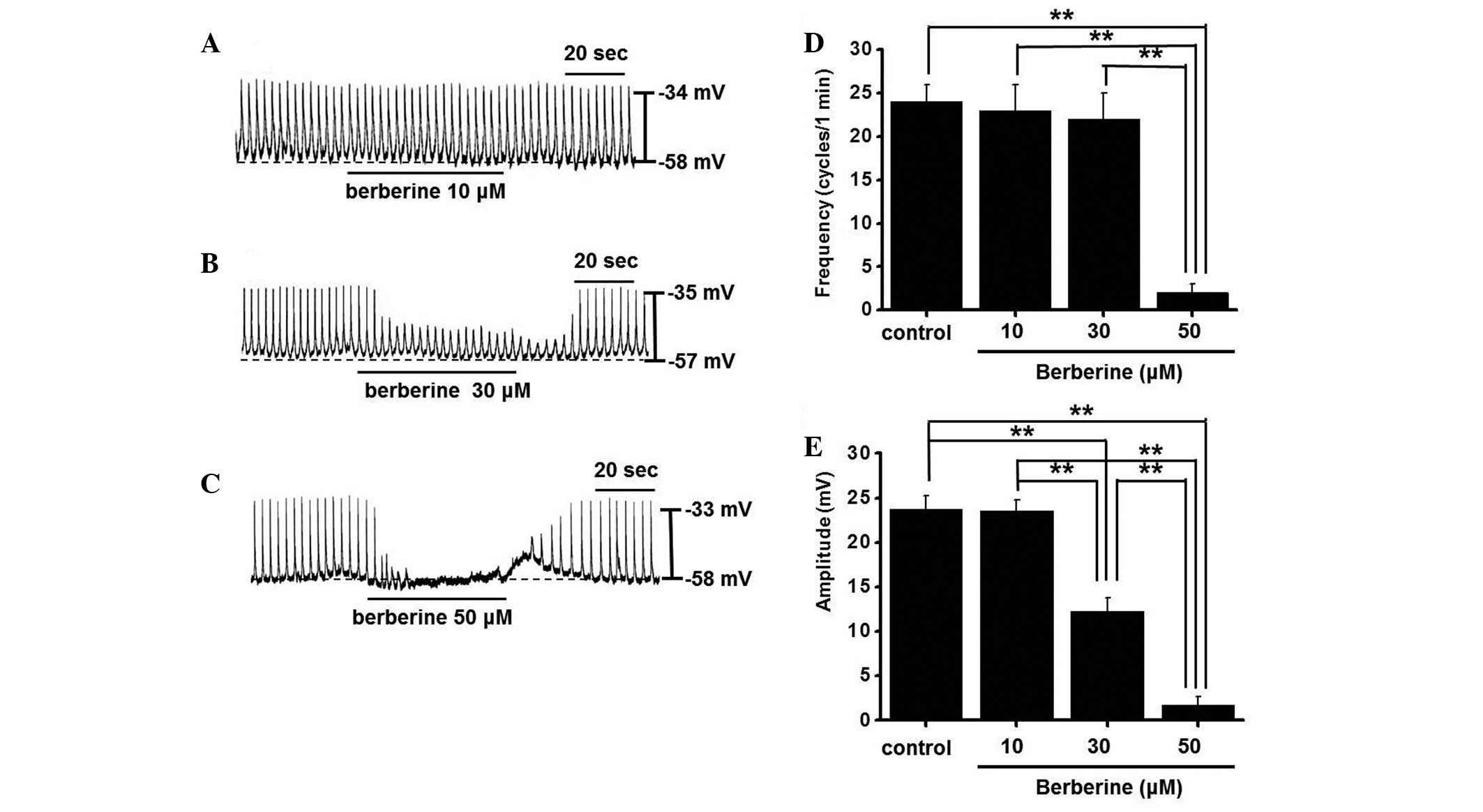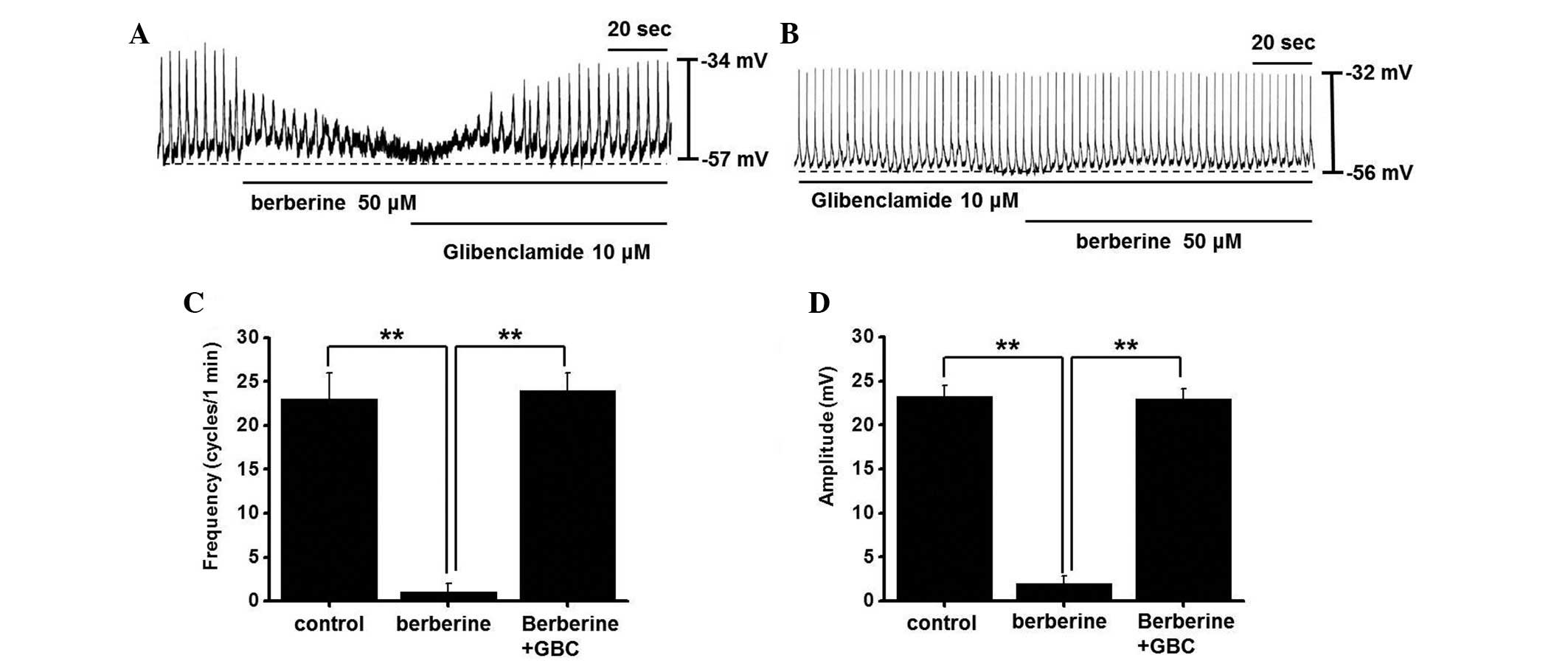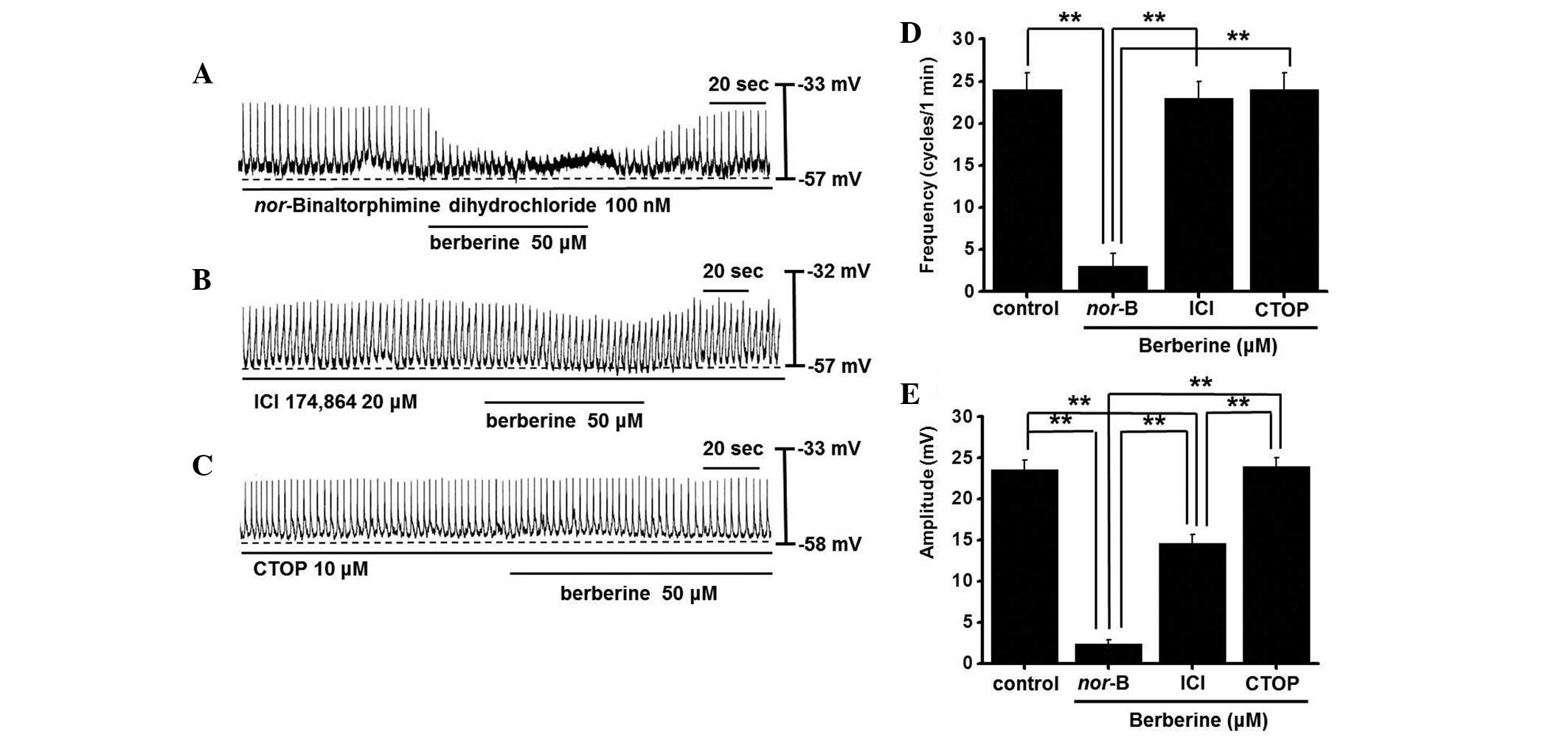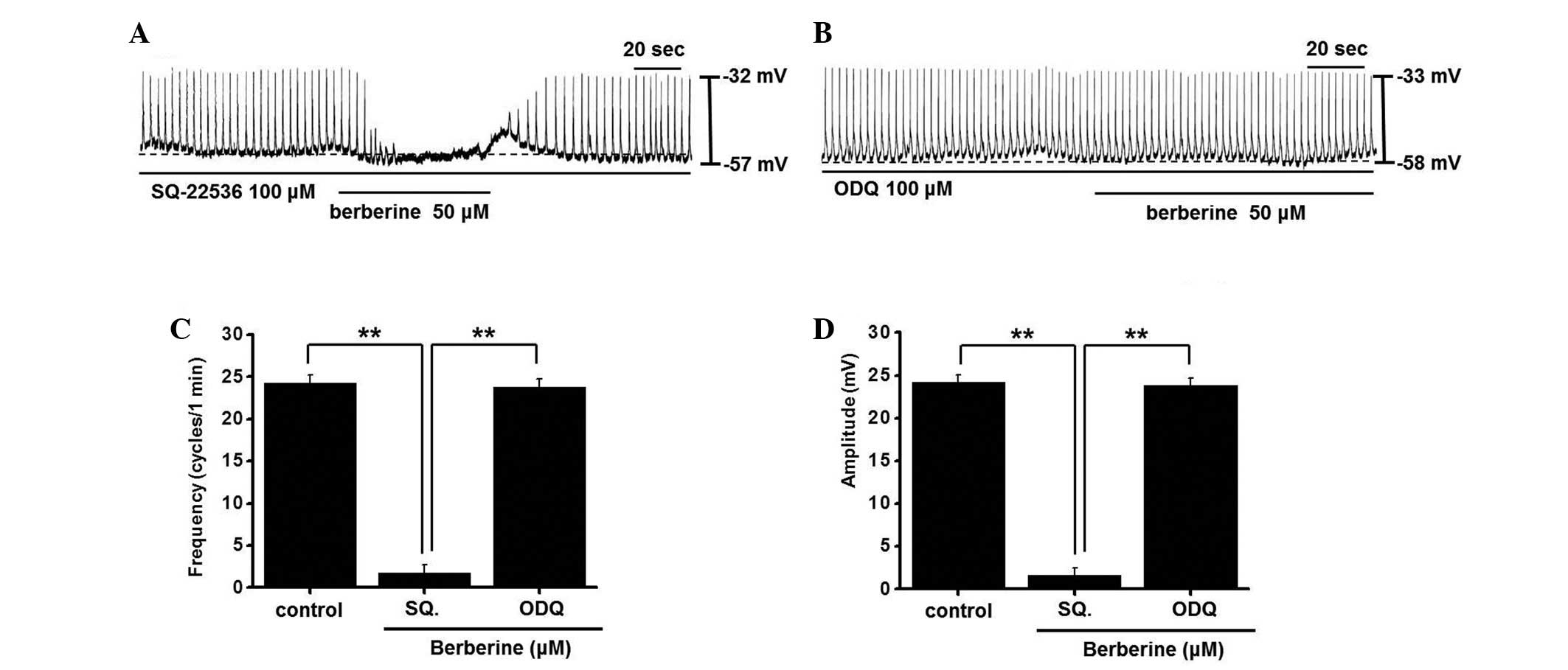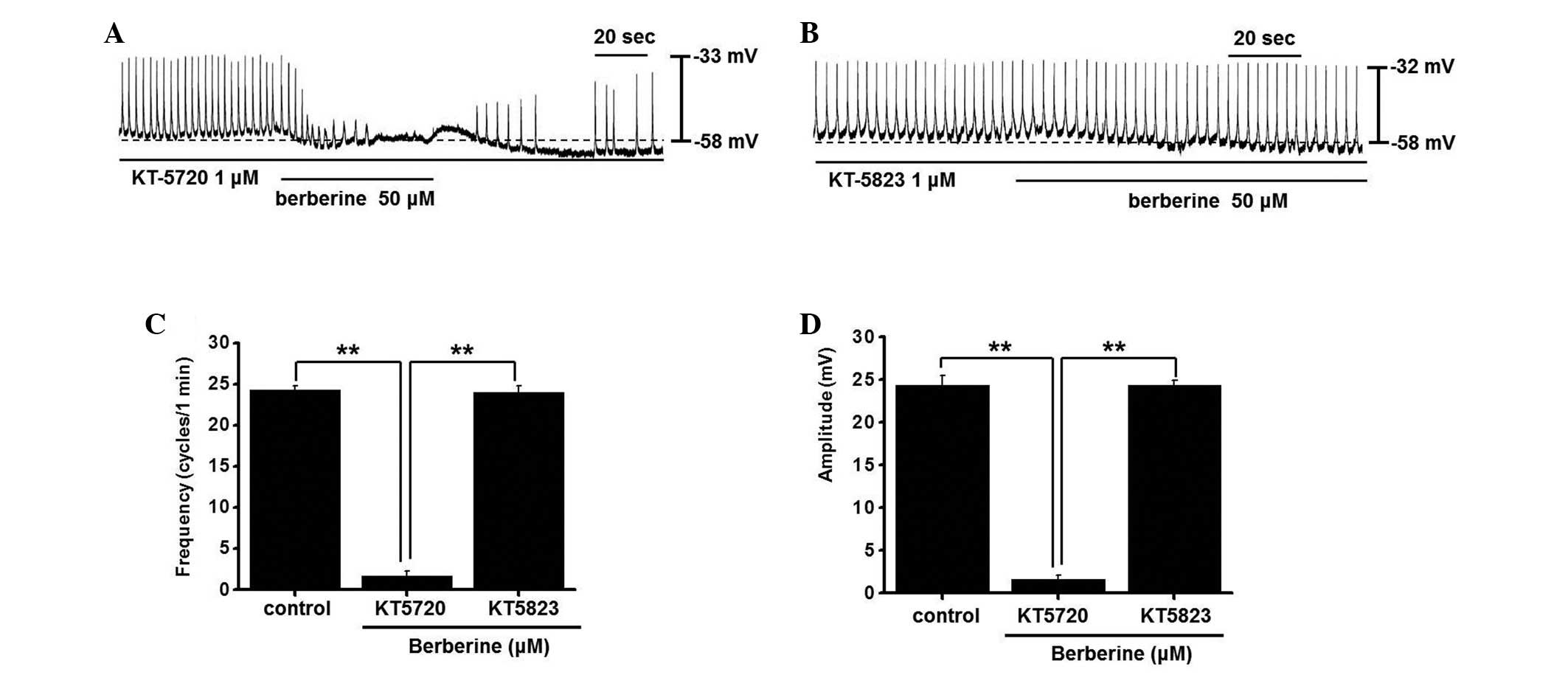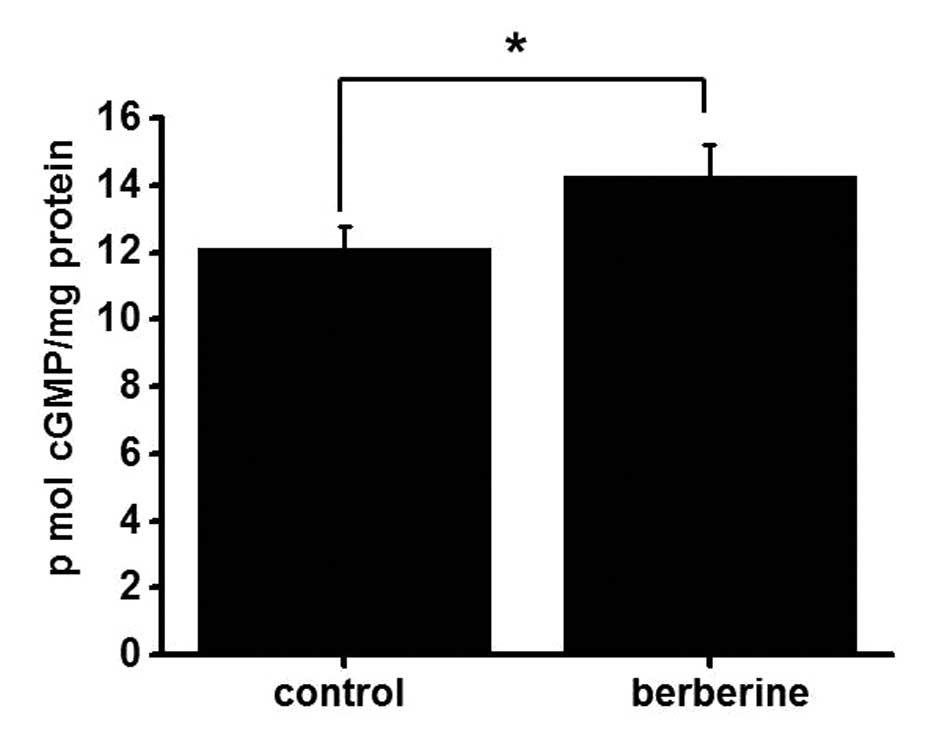|
1
|
Sanders KM, Koh SD, Ro S and Ward SM:
Regulation of gastrointestinal motility - insights from smooth
muscle biology. Nat Rev Gastroenterol Hepatol. 9:633–645. 2012.
View Article : Google Scholar : PubMed/NCBI
|
|
2
|
Liu HN, Ohya S, Nishizawa Y, Sawamura K,
Iino S, Syed MM, Goto K, Imaizumi Y and Nakayama S: Serotonin
augments gut pacemaker activity via 5-HT3 receptors. PLoS One.
6:e249282011. View Article : Google Scholar : PubMed/NCBI
|
|
3
|
Takaki M: Gut pacemaker cells: The
interstitial cells of Cajal (ICC). J Smooth Muscle Res. 39:137–161.
2003. View Article : Google Scholar : PubMed/NCBI
|
|
4
|
Kim BJ, Lim HH, Yang DK, Jun JY, Chang IY,
Park CS, So I, Stanfield PR and Kim KW: Melastatin-type transient
receptor potential channel 7 is required for intestinal pacemaking
activity. Gastroenterology. 129:1504–1517. 2005. View Article : Google Scholar : PubMed/NCBI
|
|
5
|
Nam JH, Kim WK and Kim BJ: Sphingosine and
FTY720 modulate pacemaking activity in interstitial cells of Cajal
from mouse small intestine. Mol Cells. 36:235–244. 2013. View Article : Google Scholar : PubMed/NCBI
|
|
6
|
Zhang B, Cao A, Zhou J, Hu Z and Wu D:
Effect of jatrorrhizine on delayed gastrointestinal transit in rat
postoperative ileus. J Pharm Pharmacol. 64:413–419. 2012.
View Article : Google Scholar : PubMed/NCBI
|
|
7
|
Kuo CL, Chi CW and Liu TY: The
anti-inflammatory potential of berberine in vitro and in vivo.
Cancer Lett. 203:127–137. 2004. View Article : Google Scholar : PubMed/NCBI
|
|
8
|
Jantova S, Cipak L and Letasiova S:
Berberine induces apoptosis through a mitochondrial/caspase pathway
in human promonocytic U937 cells. Toxicol In Vitro. 21:25–31. 2007.
View Article : Google Scholar
|
|
9
|
Basha SA, Mishra RK, Jha RN, Pandey VB and
Singh UP: Effect of berberine and (+/−)-bicuculline isolated from
Corydalis chaerophylla on spore germination of some fungi. Folia
Microbiol (Praha). 47:161–165. 2002. View Article : Google Scholar
|
|
10
|
Hwang BY, Roberts SK, Chadwick LR, Wu CD
and Kinghorn AD: Antimicrobial constituents from goldenseal (the
Rhizomes of Hydrastis canadensis) against selected oral pathogens.
Planta Med. 69:623–627. 2003. View Article : Google Scholar : PubMed/NCBI
|
|
11
|
Okunade AL, Hufford CD, Richardson MD,
Peterson JR and Clark AM: Antimicrobial properties of alkaloids
from Xanthoriza simplicissima. J Pharm Sci. 83:404–406. 1994.
View Article : Google Scholar : PubMed/NCBI
|
|
12
|
Tai YH, Feser JF, Marnane WG and Desjeux
JF: Antisecretory effects of berberine in rat ileum. Am J Physiol.
241:G253–G258. 1981.PubMed/NCBI
|
|
13
|
Takase H, Yamamoto K, Ito K and Yumioka E:
Pharmacological studies on antidiarrheal effects of berberine and
geranii herba. Nihon Yakurigaku Zasshi. 102:101–112. 1993.In
Japanese. View Article : Google Scholar : PubMed/NCBI
|
|
14
|
Lee S, Gim H, Shim JH, Jung Kim H, Lee JR,
Kim SC, Kwon YK, Ha KT, So I and Kim BJ: The traditional herbal
medicine, Ge-Gen-Tang, inhibits pacemaker potentials by nitric
oxide/cGMP dependent ATP-sensitive K(+) channels in cultured
interstitial cells of Cajal from mouse small intestine. J
Ethnopharmacol. 170:201–209. 2015. View Article : Google Scholar : PubMed/NCBI
|
|
15
|
Sternini C, Patierno S, Selmer IS and
Kirchgessner A: The opioid system in the gastrointestinal tract.
Neurogastroenterol Motil. 16(Suppl 2): 3–16. 2004. View Article : Google Scholar : PubMed/NCBI
|
|
16
|
Feng Y, Li Y, Chen C, Lin X, Yang Y, Cai
H, Lv Z, Cao M, Li K, Xu J, et al: Inhibiting roles of berberine in
gut movement of rodents are related to activation of the endogenous
opioid system. Phytother Res. 27:1564–1571. 2013.PubMed/NCBI
|
|
17
|
Duraffourd C, Kumala E, Anselmi L, Brecha
NC and Sternini C: Opioid-induced mitogen-activated protein kinase
signaling in rat enteric neurons following chronic morphine
treatment. PLoS One. 9:e1102302014. View Article : Google Scholar : PubMed/NCBI
|
|
18
|
Chen C, Yu Z, Li Y, Fichna J and Storr M:
Effects of berberine in the gastrointestinal tract - a review of
actions and therapeutic implications. Am J Chin Med. 42:1053–1070.
2014. View Article : Google Scholar : PubMed/NCBI
|
|
19
|
Tang QL, Lai ML, Zhong YF, Wang AM, Su JK
and Zhang MQ: Antinociceptive effect of berberine on visceral
hypersensitivity in rats. World J Gastroenterol. 19:4582–4589.
2013. View Article : Google Scholar : PubMed/NCBI
|
|
20
|
Mo C, Wang L, Zhang J, Numazawa S, Tang H,
Tang X, Han X, Li J, Yang M, Wang Z, et al: The crosstalk between
Nrf2 and AMPK signal pathways is important for the
anti-inflammatory effect of berberine in LPS-stimulated macrophages
and endotoxin-shocked mice. Antioxid Redox Signal. 20:574–588.
2014. View Article : Google Scholar :
|
|
21
|
Tan W, Li Y, Chen M and Wang Y: Berberine
hydrochloride: Anticancer activity and nanoparticulate delivery
system. Int J Nanomedicine. 6:1773–1777. 2011. View Article : Google Scholar : PubMed/NCBI
|
|
22
|
Hsu YY, Tseng YT and Lo YC: Berberine, a
natural antidiabetes drug, attenuates glucose neurotoxicity and
promotes Nrf2-related neurite outgrowth. Toxicol Appl Pharmacol.
272:787–796. 2013. View Article : Google Scholar : PubMed/NCBI
|
|
23
|
Dong H, Zhao Y, Zhao L and Lu F: The
effects of berberine on blood lipids: A systemic review and
meta-analysis of randomized controlled trials. Planta Med.
79:437–446. 2013. View Article : Google Scholar : PubMed/NCBI
|
|
24
|
Derosa G, Maffioli P and Cicero AF:
Berberine on metabolic and cardiovascular risk factors: An analysis
from preclinical evidences to clinical trials. Expert Opin Biol
Ther. 12:1113–1124. 2012. View Article : Google Scholar : PubMed/NCBI
|
|
25
|
Bhutada P, Mundhada Y, Bansod K, Tawari S,
Patil S, Dixit P, Umathe S and Mundhada D: Protection of
cholinergic and antioxidant system contributes to the effect of
berberine ameliorating memory dysfunction in rat model of
streptozotocin-induced diabetes. Behav Brain Res. 220:30–41. 2011.
View Article : Google Scholar : PubMed/NCBI
|
|
26
|
Gu L, Li N, Yu W, Gong J, Li Q, Zhu W and
Li J: Berberine reduces rat intestinal tight junction injury
induced by ischemia-reper-fusion associated with the suppression of
inducible nitric oxide synthesis. Am J Chin Med. 41:1297–1312.
2013. View Article : Google Scholar
|
|
27
|
Tsai CS and Ochillo RF: Pharmacological
effects of berberine on the longitudinal muscle of the guinea-pig
isolated ileum. Arch Int Pharmacodyn Ther. 310:116–131.
1991.PubMed/NCBI
|
|
28
|
Lee TH, Kim KH, Lee SO, Lee KR, Son M and
Jin M: Tetrahydroberberine, an isoquinoline alkaloid isolated from
Corydalis tuber, enhances gastrointestinal motor function. J
Pharmacol Exp Ther. 338:917–924. 2011. View Article : Google Scholar : PubMed/NCBI
|
|
29
|
Chen DP, Xiong YJ, Lv BC, Liu FF, Wang L,
Tang ZY and Lin Y: Effects of berberine on rat jejunal motility. J
Pharm Pharmacol. 65:734–744. 2013. View Article : Google Scholar : PubMed/NCBI
|
|
30
|
Cosola C, Albrizio M, Guaricci AC, De
Salvia MA, Zarrilli A, Sciorsci RL and Minoia R: Opioid
agonist/antagonist effect of naloxone in modulating rabbit jejunum
contractility in vitro. J Physiol Pharmacol. 57:439–449.
2006.PubMed/NCBI
|
|
31
|
Reisine T and Bell GI: Molecular biology
of opioid receptors. Trends Neurosci. 16:506–510. 1993. View Article : Google Scholar : PubMed/NCBI
|
|
32
|
Minami M and Satoh M: Molecular biology of
the opioid receptors: Structures, functions and distributions.
Neurosci Res. 23:121–145. 1995. View Article : Google Scholar : PubMed/NCBI
|
|
33
|
Bagnol D, Mansour A, Akil H and Watson SJ:
Cellular localization and distribution of the cloned mu and kappa
opioid receptors in rat gastrointestinal tract. Neuroscience.
81:579–591. 1997. View Article : Google Scholar : PubMed/NCBI
|















